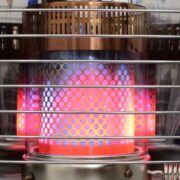A water heater is an appliance that takes up water from the water supply pipe and warms it. Heaters draw power from a power source to heat water and then pump it out for use. The water could pass through a tank or flow out directly, depending on the heater model. At home, water heaters help in warming water for dishwashing, bathing, cooking e.t.c. Some factories also rely on water heaters to warm water for industrial use.
The water that we draw from our taps comes loaded with many impurities. Minerals, sediment, and hard water will shorten the lifespan of your heater. They will also affect the faucets, showerheads, and general plumbing in your house. Impurities accumulate in the heater system, gradually decreasing its efficiency. Debris build-up significantly reduces the lifespan of your water heater. To avert the trouble, we recommend the use of a filter for protection. You can visit the Water Filter Guru’s website for advice on how to get uncontaminated water.
What Is A Water Heater Filter?
To guard your water heater against the effects of harmful minerals, you need to install a filter. Contrary to what the name suggests, a water heater filter does not work by filtering water. Instead, it has a media that inhibits raw water impurities before settling on the heater’s tank bottom or element. In a tankless heater, accumulation of scale corrodes the internal parts.
How Does A Water Heater Filter Work?
A water heater filter treats water before it enters your water heater. It has a cartridge filled with media that inhibits magnesium and calcium minerals. If left untreated, the minerals scale up on the heater surface and tank bottom. The media from the filter forms a protective layer that safeguards your heater and plumbings from corrosion.
A filter receives raw water from your main source. Water flows through the filter and mixes with the components inside. As this happens, the water picks up some media that crystalizes the minerals. The minerals dissolve and flow out in their new form without settling on the element, tank, or orifices.
How Durable Is A Water Heater Filter And Does It Need Maintenance?
The lifespan of your water heater filter is determined by the amount of water that you use. The purity level of the water is also a determining factor in how long the filter will last. Every filter manufacturer gives an estimated lifespan based on the gallons of water used and how clean the water is. That means a filter used with pre-treated water will last longer than one used with well water.
A water heater filter needs some maintenance procedures to perform at its level best. Regular flushing of the tank will help get rid of the accumulated dirt that could block the filter. Clean the air filter of dust as too much of it makes the heater ineffective and more energy-consuming. Water heater filter cartridges need replacement every few months depending on your usage. The inlets and outlets need debris cleaning by undoing the filter housing and using a paper clip.
What Are The Qualities Of A Good Water Heater Filter?
A good water heater filter should have a robust body. The most recommended housing material is stainless steel which will endure the corrosive substances found in water. In comparison to plastic, stainless steel filters will come at a higher price. The material is durable and less likely to burst.
Depending on your budget, you may opt to go for the plastic filter. Make sure that the housing is a single mold inclusive of pressure release valve holes. Reject it if the installer has to manually drill holes on the housing as this would weaken the head. These types of filters are easily breakable and prone to leaks.
What Should I Consider Before Selecting A Specific Water Heater Filter?
There are various types of water heater filters in the market. Before you buy one, it is good to ask yourself why you need it. Different filters are capable of cleaning some types of impurities while skipping others. It would thus be wise to have your water tested in a laboratory. This test gives you an analysis of the contaminants present in your water, helping you select a suitable filter.
You should also check if the filtration rate corresponds with your daily consumption volume. Lastly, do not base your budget on the initial cost alone. The installation cost, operation, and maintenance matter a lot. If possible, go for the option that requires less frequent cartridge changes.














Comments